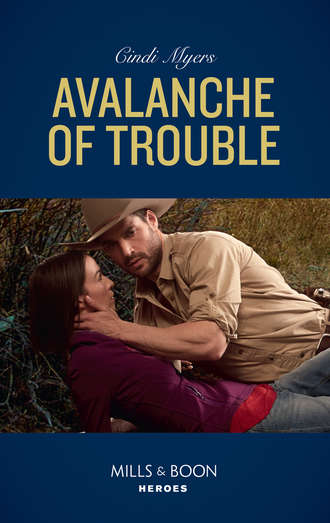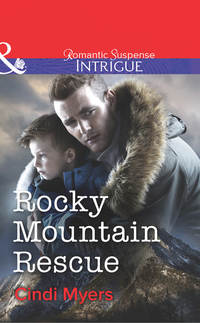
Полная версия
Avalanche Of Trouble
“I just want to speak to Deputy Walker.”
“Of course. I’ll get him here as soon as I can.”
Then Maya was alone in the office, a claustrophobic cube of a room with barely enough space for a desk and one visitor’s chair. She sat and studied the walls, which were filled with several framed commendations and half a dozen photographs, all featuring a tall, good-looking man with thick brown hair and the weathered face of an outdoorsman. In one picture, he knelt beside a mountain stream, cradling a colorful fish and grinning at the camera. In another, he supported the head of a trophy elk, golden aspens in the background. In a third photograph, he posed with another officer, both of them in uniform and holding rifles.
“That’s Gage and his brother, Travis.” Adelaide spoke from behind Maya. She set a cup on the edge of the desk. “I brought you some tea,” she said. “I know you said you didn’t want anything, but after such a long drive, you look like you could use something.”
“Tea is fine.” Maya picked up the cup and sat stiffly upright in the chair. “So Gage and Travis are both law enforcement officers?”
“Travis is the county sheriff,” Adelaide said. “He’s out with the others. We’re all just sick about this. Things like this just don’t happen in Eagle Mountain.”
“They happen everywhere, Addie. You know that. We’re not special.”
The man who moved into the room past Addie was tall and rangy, his khaki uniform streaked with dirt, his face creased with exhaustion. “Gage Walker,” he said, extending his hand to Maya. “I’m sorry I wasn’t here to meet you.”
“I told her you were out looking for her niece,” Adelaide said.
“We’ve got everybody in the county with any kind of experience in the woods out there looking for her,” Gage said. The chair behind the desk creaked under his weight as he settled into it, and the office seemed more claustrophobic than ever with his oversized, very masculine presence. Adelaide returned to the front office, leaving them alone.
Gage didn’t say anything for a moment, his eyes fixed on Maya, his expression unreadable. “Why are you looking at me that way?” she asked, setting the teacup on the desk.
He shook his head, as if coming out of a daze. “You said you’re a teacher?”
“Yes. I teach high school English at Centennial High School.”
Gage shook his head again. “None of my teachers ever looked like you.”
She stiffened. “What is that supposed to mean?”
“Well, for one thing, none of them had blue hair.”
She touched the ends of her hair, which she had dip-dyed blue only two weeks before. “I made a deal with my students. If they brought up their achievement test scores, I would dye my hair blue.”
“Just not what I expected.”
He wasn’t what she had expected, either. He wasn’t slow and dumb, but he definitely looked right at home in this rugged country.
“What happened to my sister?” she asked.
“We’re still trying to get a complete picture, but it looks like your sister and her husband were in their camp when someone—probably more than one person—came up, tied their hands behind their backs and shot them.”
The picture his words created in her mind was almost too horrible to bear. She forced the image away and bit the inside of her cheek to stave off tears. She couldn’t break down now. She had to be strong. “They just shot them?”
“I’m sorry, yes.”
“Why? And what happened to Casey?”
“We’re trying to find the answers to both those questions. It’s possible whoever shot your sister and brother-in-law took Casey with them. But it’s also possible she ran away.” He leaned toward her. “Tell me about your niece. Is she a shy child—the type who would hide from strangers?”
“Casey isn’t really shy, no. But if she saw someone hurt her mother and father, of course she’d be afraid. And having a bunch of people she didn’t know stomping around the woods looking for her would probably frighten her even more.” She had a clear picture of the little girl, hiding behind a big rock or tree, watching all the commotion around her and too afraid to come out. “I want to go look for her. She knows me. She won’t hide from me.”
He nodded. “That makes sense. I’ll take you up to the camp, but I can’t allow you to go wandering around in the woods on your own. The terrain is rough and it’s getting dark. Even the trained searchers will have to pack it in soon and wait until morning.”
“Maybe she’s close to the camp and she’ll see me and come to me.” Maya stood. “Let’s go now. I don’t want to waste another minute.”
Gage rose also and motioned toward the door. “After you. My cruiser is parked out front.”
The black-and-white SUV sported the requisite light bar on top and the legend, Rayford County Sheriff’s Department, on the door. Gage walked around and opened the passenger door, then leaned in and scooped an armful of papers, file folders, gloves, a flashlight and who knew what else off the front seat. “Welcome to my mobile office,” he said, holding the door wide for her.
She climbed in, studying the tablet computer mounted to face the driver, the radio and the shotgun in a holder beside her seat. Gage buckled his seat belt and started the engine. “You said your sister and her husband had just bought the property they were camping on?” he asked as he pulled out into the street.
“Yes. They closed on the purchase last week and wanted to spend some time up there, enjoying the scenery.” She choked on the last word. Angela wouldn’t be enjoying anything anymore.
“So they bought the property to have a place to camp? Or did they plan to build a house up there?”
“Not a house, no. They bought up a bunch of old mining claims, with plans to reopen the mines.”
“Interesting choice.” He turned onto the highway, leaving the town behind. “Most of those old mines haven’t been worked in fifty or sixty years or more. Even then, most of them never earned much. Though I guess some people do still dig around in them as a hobby.”
“This wasn’t a hobby. Greg is—was—an engineer. He’s developed new techniques he thinks will make those old mines profitable again. He wanted to do a demonstration project here, and use that to sell his equipment to others.”
“That sounds like it could end up being pretty lucrative,” Gage said. “Did he have competitors? Anyone who might have killed him to get his ideas or to stop him from implementing them?”
“No! That’s crazy. He doesn’t know people like that. And he had patents on all the equipment he had designed. People don’t kill other people over things like that. If they wanted his ideas, they could have bought him out—or tried to.”
“So he never mentioned having been threatened by anyone?” Gage asked.
“No. And Angela would have told me if he had. She wasn’t one to hide her emotions from me. And if either one of them had thought they were in any danger at all, they never would have brought Casey up here.”
“Can you think of any reason someone would have killed them?” Gage asked. “Something in their pasts, maybe?”
“No.” She shook her head, fresh tears flowing in spite of her efforts to hold them back. “They were quiet, ordinary people.” She blotted the tears with her fingers and angled toward him. “Maybe they stumbled on drug activity—a meth lab or something like that—and were murdered because of it.”
“It’s possible,” Gage said. “And we’ll look into it. But most of the meth labs have moved to Mexico these days.” He slowed as they approached a bank of lights—headlights, work lights, even flashlights bobbed about in the woods on either side of the road.
“This is where they were killed?” Maya asked, staring at the confusion of lights and people—and lots and lots of trees and rocks and dirt. This was the place Angela had gushed about as being so beautiful?
“Yes.” Gage shut off the engine. “Stay with me,” he said. “If you go wandering off around here, you could end up falling down an abandoned mine shaft or stepping off a cliff.”
“Those things could have happened to Casey,” she said, climbing out of the SUV and following him down the side of the road.
“Hey, Gage.”
“Hi, Gage.”
“Thought you’d packed it in for the night?”
Various people greeted the deputy as they passed. An older man with a crooked nose and bushy eyebrows approached. “Deputy Walker, what are you doing about the press?” he asked.
“I’m not really concerned about the press right now, Larry,” Gage said. He turned to Maya. “Maya Renfro, this is Eagle Mountain’s mayor, Larry Rowe.”
“Ms. Renfro.” The mayor nodded solemnly. “I’m very sorry for your loss.” He turned to Gage. “Now, about the press. Something like this could reflect very badly on the town if it isn’t handled properly.”
“Not now, mayor.” Gage pushed past him, only to be waylaid a few yards farther on by a petite woman with a large red hound on a leash. “Did you get anything?” Gage asked her.
“I’m sorry, no.” The woman stopped and leaned down to pat the dog. “Daisy picked up the scent from the shirt you gave me, but after about a hundred yards, she lost it. I marked the path for you. And we can try again tomorrow if you like. Right now, Daisy is just tired and frustrated.”
Daisy stared up at them with mournful brown eyes, then let out a low moan and scratched at one floppy ear with her hind foot.
“Thanks for trying, Lorna,” Gage said. He patted Daisy. “Give her a biscuit from me.”
Maya spotted Greg and Angela’s SUV and faltered. The vehicle was surrounded by a cordon of yellow-and-black tape, and more tape marked a path from the vehicle into the woods. “Is that your sister and her husband’s car?” Gage asked.
“Yes.”
He took her arm. “Come on. I’m going to take you into their camp, ask you to identify some things. Their bodies have already been taken away. Can you do that for me?”
“Yes.” They were just things. She wouldn’t think about them in relation to death.
“Step where I step,” Gage said. “Don’t get off the path or touch anything.” He led the way through a section of tape.
“That’s their tent,” she said as they approached the blue dome tent. “They bought it a couple of years ago, to replace an old one our parents gave them.”
“All right.” Gage led her to the tent and pulled back the flap. “Take a look inside and tell me if you see anything unusual—anything that doesn’t belong to your sister, her husband or Casey.”
He swept the beam of the flashlight over the contents of the tent—sleeping bags, backpack, clothing, Angela’s purse. Maya covered her mouth with her hand when she spotted the purse and shook her head, swallowing hard against the sob that threatened to escape.
Gage dropped the tent flap and straightened, playing the beam of the light around and behind the tent. Pink tape fluttered from a slender metal stake behind the tent. “This is where Lorna and her dog picked up the scent,” he said, guiding Maya over to the stake. “Don’t walk in the path, but walk beside it. Call your niece. If she’s near enough, she might recognize your voice and come to you.”
Maya stared at him, still numb. “Calling her isn’t going to help,” she said. “We have to look for her.”
“Call her. She might hear you. Identify yourself and if she’s hiding, she might come out.”
Maya shook her head, the tears flowing freely now. “You don’t understand,” she said. “I could call all night and it wouldn’t make any difference. Casey wouldn’t hear me. She’s deaf.”
Chapter Three
Gage stared at Maya. “Your niece is deaf and you’re just now telling me?” he asked.
“I’m sorry! I was in shock. And it’s not like I think of Casey as my deaf niece. She’s just my niece. Being deaf is part of her, the way having brown hair is part of her.”
“This is a little more significant than her hair color.”
“I said I’m sorry.” She stared into the surrounding darkness, looking, he was sure, for the little girl. Gage stared, too, his stomach knotting as the difficulty of their task sank in. Simply getting within earshot of Casey Hood wasn’t going to be enough. They were going to have to get her in their sights, and then somehow persuade her that they were friendly and wanted to help her. All of that required light, which meant waiting until tomorrow to continue the search.
He touched Maya’s shoulder. “Come on,” he said. “Let’s go.”
She stared at him, eyes wide, red rimmed from crying. She didn’t look quite as young as she had when she had first walked into his office. The blue-tipped hair and dangling earrings had him thinking she was a teenager then. He saw the maturity in her eyes now, and the desperate struggle to keep hope alive. “We can’t just leave her out there all night—alone,” she said.
“We’re going to have someone here all night,” he said. “I’ll have them build a fire and keep it going. Maybe Casey will see it.”
“I should be the one waiting,” she said.
“No. You should go back to your hotel room and try to get some sleep.” She started to argue, but he cut her off. “We’re going to need you in the morning. Once it’s light out here and we can see, we’re going to need you close in case someone spots Casey. She’ll recognize you and want to come to you.”
She looked out into the darkness again. “Do you really think she’s all right?”
“We haven’t found evidence to the contrary,” he said. “No signs of struggle, no other signs of blood at the scene. I think she got away from the killers.” Whoever shot Angela and Greg Hood might have taken the child with them, but that didn’t make sense to him. The parents’ deaths had been cold and efficient—for whatever reason, someone had wanted them eliminated. Why then burden yourself with a five-year-old child? “I think Casey saw what was happening, became frightened and ran away. Tomorrow, we’re going to find her.” He touched her shoulder again. “Come on. I’ll take you back to your hotel.”
“I don’t have a hotel room. I mean, I didn’t call and make a reservation. I didn’t even think of it.”
“Then we’ll find you one. Come on.”
She made one last glance into the darkness beyond the camp, then followed Gage to his SUV. “I’m going to speak to the sheriff,” he said. “I’ll be right back.”
He found Travis with a group of search and rescue volunteers who were packing up to head back to town. “I got some more information about the little girl we’re looking for,” Gage told them. “Seems she’s deaf. So shouting her name isn’t going to do any good. We’ll need to make eye contact.”
“I know a little American Sign Language,” one of the SAR volunteers, a middle-aged woman, said.
“That might come in handy,” Gage said. “Can you come back to help with the search tomorrow?”
“I’ll be here.”
They said good-night. Travis waited until he and Gage were alone before he spoke. “Does the sister have any idea what the Hoods were doing up here that got them killed?” he asked.
Gage glanced back toward his SUV. He could see the shadowed figure of Maya as she sat in the passenger seat. “Greg Hood was an engineer who had developed some new equipment he thought could make these old mines profitable. He purchased these old claims to create a kind of demonstration project. He and his wife and the kid were camping up here, checking out their new acquisition.”
“Any enemies, threats, anything like that?” Travis asked.
“She says no, and she thinks she would know. Sounds like she and the sister were close.”
“All right. Maybe we’ll turn up something when we have a chance to go over the evidence from the scene. And I’m going to talk to Ed Roberts.”
Gage thought of the old man who was as close as Eagle Mountain came to a hermit. He lived in an apartment above the hardware store, but spent most of his time working an old gold mining claim in the area. “Is his claim around here?” he asked.
“Behind this property.” Travis gestured toward the north.
“You think he might have seen or heard something?”
Travis’s expression grew more grim. “And he’s a registered sex offender.”
Gage stared. He knew the department received regular updates from the sex offender registry, but he didn’t remember Roberts’s name being on there. Maybe it dated from before his time with the department. Now he felt a little sick to his stomach. “Did he molest some kid or something?”
“He was convicted of exposing himself to women—flashing them. It happened years ago, in another state, but still...”
“Yeah,” Gage said. “Still worth questioning him.”
“In the meantime,” Travis said, “we’ll have someone up here overnight and we’ll start the search again at first light.”
“That little kid must be scared to death, out there in the dark by herself,” Gage said.
“At least if she’s scared, it means she’s still alive,” Travis said. He clapped his brother on the shoulder. “Go home. Try to get some rest. Pray that in the morning we get lucky.”
“I’m going to find a place for Maya to stay. I’ll probably pick her up in the morning and bring her up here with me. She’s the person the kid is most liable to run to on sight.”
“Good idea.”
Maya sat hunched in the front seat, hugging herself. “I should have started the engine so you could get warm,” he said, turning the key in the ignition. “Even in summer, it can get chilly up here at night.”
“I keep thinking about Casey, cold and alone out there in the dark,” she said.
“Most of the time, with little kids like this, they get tired and lie down somewhere,” Gage said. “We’re hoping she’ll see the fire at camp and come back there. A husband-and-wife team with the search and rescue squad have volunteered to stay there. They’ve got kids of their own, so they shouldn’t be too scary to Casey.”
“If she comes to them, you’ll call me.” It wasn’t a question.
“Of course,” Gage said. “As soon as we hear anything.”
They drove back toward town in silence. Full darkness had descended like a cloak, the sky a sweep of black in the windshield. When he had a cell signal, Gage pulled out his phone and made a call. “Hello?” The woman on the other end of the line sounded cautious, and maybe a little annoyed.
“Paige, this is Gage Walker. Sorry to bother you so late, but I’ve got a lady here who needs a room for the night—probably several nights. She’s the aunt of the little girl we’re searching for.”
“I heard about that,” Paige said. “Poor thing. And I do have a room. It’s my smallest one, but I doubt she’ll care about that.”
“Great. I’m going to take her to get something to eat, then we’ll stop by.”
“Sure thing, Deputy.”
“When was the last time you ate?” he asked Maya as they neared town.
“I had a sandwich at lunch,” she said. “That seems like days ago.”
“And now it’s almost ten. I know you probably don’t feel like eating, but you should. And I’m starving. Let me buy you dinner, then I’ll take you over to the Bear’s Den.”
“The Bear’s Den?”
“It’s a bed-and-breakfast. You should get along great with the woman who runs it.”
“Why do you say that?”
He glanced at her, but it was too dark for him to read her expression. “The hair, the VW bug, the English degree—trust me, the two of you will get along great.”
“Why do I get the feeling that’s not exactly a compliment?”
“It’s not an insult,” he said.
“Then what is it?”
He searched for the right words—words that weren’t going to offend her, that would convey what he really meant. “You stand out from the crowd around here,” he said. “That’s not a bad thing.”
“You mean the blue hair,” she said.
“The blue hair. The attitude.”
“You think I have an attitude?” Her voice rose and she leaned toward him.
Gage bit back a groan. Yes, she had an attitude—a “don’t mess with me” vibe that shone through the grief and fatigue. “I didn’t say it was a bad attitude,” he said. “And hey, maybe I’m full of it. Ignore everything I said.”
“You’re not the kind of man a woman ignores, Deputy.”
The words jolted him. Was she flirting with him? But when he glanced her way, she was facing forward again, what he could see of her expression betraying nothing.
Mo’s Pub was the only place open this late, so Gage drove there. When they walked in the waitress showed them to a booth. “Any word on that lost little girl?” she asked as she distributed menus.
“Not yet,” Gage said.
“Tony was up there all afternoon with the search and rescue crew, and we’re all praying y’all find her soon. Poor little baby. She must be scared to death up there on her own.”
“This is Casey’s aunt, Maya Renfro,” Gage said. “This is Sasha Simpson.”
“You poor thing.” Sasha patted Maya’s shoulder. “You must be worried sick. They’re gonna find her, I’m sure of it. They won’t stop looking until they do.”
“Thanks.” Maya looked a little dazed as Sasha hurried away to wait on another table. “She sounded really worried—and she doesn’t even know me or Casey.”
“She has two little girls of her own,” Gage said. “And that’s the way people are around here. Everybody knows everybody and while it’s not exactly family, it’s something like it.”
“I can see how that would be appealing,” she said. “But a little claustrophobic at times, too. Sometimes I like not knowing anything about my neighbors.”
Sasha returned and took their orders. Maya ordered a salad, which he expected she wouldn’t eat, but she was drinking her soft drink, so that was something. “So what do you do in Denver besides teach English?” he asked.
“I do poetry slams.”
Again, not what he would have expected. “That’s where people get up and perform poetry they’ve written, right?”
“Exactly.” She didn’t even try to hide her surprise.
“We may be a little out of the way here in Eagle Mountain, but we’re not completely backward,” he said.
“Have you ever been to a poetry slam?” she asked.
“No. But then, I can’t say I’ve ever cared much for poetry. Probably comes from having to memorize ‘O Captain! My Captain!’ when I was in fourth grade.”
“My poetry isn’t like that.”
“I kind of figured.”
She fell silent and Gage focused on his food as soon as Sasha had placed the dishes on the table. When he looked up again, Maya was staring at him. “I’d like to see Angela,” she said softly.
He should have seen that coming. “I can arrange that. Maybe late tomorrow.” He leaned toward her. “Is there someone else you should call to be here with you? Another sibling? Your parents?”
“I spoke to my parents after I talked to you,” she said. “They live in Arizona. My mom isn’t in good health and traveling is hard for her. And there’s nothing they can do. I told them they should stay put until we know more. And there aren’t any other siblings.”
“Okay.” So she had to bear this all by herself. He would do what he could to ease the burden for her.
“What about you?” she asked. “I know you have a brother—the sheriff. Any other brothers and sisters?”
“I have a sister. She’s a graduate student at CSU. Our parents have a ranch just outside of town.”
She speared a cherry tomato on her fork. “A ranch as in cows?”
“And horses. The Walking W Ranch has been in operation since 1942. My great-grandparents started it.”
“So do you, like, ride and rope and all that stuff?” she asked.
He suppressed a grin. “All that stuff.”
“That explains the belt buckle.”
He glanced down at the large silver-and-gold buckle, which he had won as State Junior Champion Bronc Rider in high school. “I was riding horses years before I learned to ride a bicycle,” he said. “And I still help out with fall roundup.”
She shook her head. “Our lives are so different we could be from two different countries.”
“We’re probably not that different,” he said. “I’ve found that people behave pretty much the same wherever they’re from.”
“Well, I’m from the city and I have no desire to ride a horse. And I hope you won’t take this wrong, but I thought my sister was crazy when she said she and Greg were thinking about moving here.”











